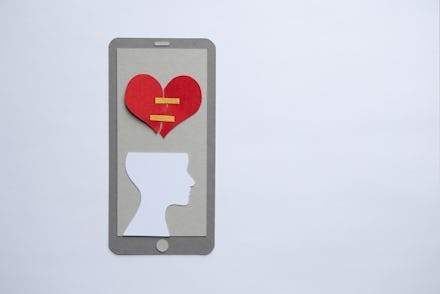How a gratitude app helped me finally let go of my post-breakup rage

The research on the benefits of gratitude is everywhere. The reality that cultivating a gratitude practice can make you happier, healthier, and potentially more successful is aggressively pushed on us all the time. And rightfully so — there’s science to how gratitude practices can help you have healthier relationships with yourself and other people. I’m kind of a hater when it comes to trends in positive psychology, but I decided to try out a gratitude app anyway, just to see if there was anything to it. Ironically enough, I found that gratitude could help me dig up some joy from my darkest mental spaces.
I started using the gthx app a few months ago on my phone. This app offers a technological buffet of gratitude-enhancing options. You can start a journal, send thank you notes and videos to friends, or press a button every time you’re feeling grateful. My favorite feature is this candle flame frame that chooses a random photo from your library and encourages you to you to “create a warm feeling around the image.” I have thousands of great pics in my library. What could go wrong?
The first picture that popped up when I tapped the flame was a BDSM meme. That was funny and ironic, but I actually am really grateful about how lucky I am to be able to express myself sexually, so it worked. The next pic that popped up was my most recent ex. Nope. Too soon. I clicked again. Again, he popped up. Seriously? I only have like three photos of him, what are the chances? I thought about clicking again, but decided to stick with it.
As the flame frame glowed around his face, I thought about how unhealthy our relationship was and how grateful I was to be out of it. But something in the back of my psyche nagged me. Isn’t the point to think about why you’re grateful for what’s in the frame, I wondered, not why you are grateful it’s not around anymore? So, I paused and stared at the pic of my ex, a tall man smiling down at me. That same man would, a week after the picture was taken, be sending six scroll long texts about what was wrong with me, him, and us. My brain invaded the happy moment captured in the photo with feelings of heartbreak and betrayal.
But, after staring at the picture with its candle flame frame for several minutes, I realized that, actually, I am deeply grateful to him. It didn’t work out between us romantically, but I learned a lot about myself while we together. I don’t mean just in the happy 'grammable moments, but also in the dreadful extended textual breakup. Maybe especially in those parts. Not that I enjoyed that time. When we broke up, I was kind of a sad sack of existential despair prone to saying things like, “Every living thing dies alone.” I had to go to my therapist double time for two months.
During those months in therapy, I figured out, with the help of my very skillful therapist, that a lot of the issues that came up with me and my ex were not about him or us. They were decades old issues that I had just never dealt with. Childhood trauma. Fear of abandonment. That kind of fun stuff.
What I realized over the course of those sessions is that I have a real tendency to respond to intimacy by becoming emotionally unavailable in order to protect myself from being hurt. Self knowledge was a bitter pill, but swallowing it has forced me to grow. Without my ex, it could have taken me a lot longer to come to the realizations that will, hopefully, help me have better relationships in the future.
Thinking all this through helped me develop a palpable sense of gratitude towards my ex. Where once I thought of him with a dismissive shrug and a smirk, I now have a little smile. Having a friendly attitude towards him in my head makes me feel good. That doesn’t mean we have to be friends. We are not friends, and I doubt that we ever will be, and that’s okay. It’s the inner monologue that matters, I’m told.
Self knowledge was a bitter pill, but swallowing it has forced me to grow.
“I think we can always be grateful for what those experiences taught us,” says Stefani Goerlich, a Detroit-based psychotherapist who works with many clients who are transitioning out of relationships. But each relationship gives us deeper insights into what we want in a partnership as well as what our limits and boundaries are. There is immense power in claiming the benefits of a bad experience.” But can an app help us do that? Yes, says Goerlich, “If the users are able to contextualize their gratitude.”
“We know that not all memories are positive, “ Omar Brownson, CEO and founder of gthx tells me. “The gthx candle allows us to look inwards at our own photos and memories through the lens of gratitude. We can reframe our relationship to every memory. What people like most about the candle is the surprise.” My experience, then, is a result of the app’s intentional design. Yes, the pics are random, but gthx was created to encourage people to be grateful for whatever pops up, no matter how trivial or negative. “Gratitude is more powerful when it’s spontaneous,” Brownson says. Indeed.